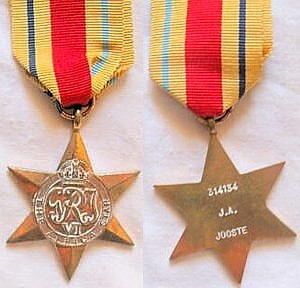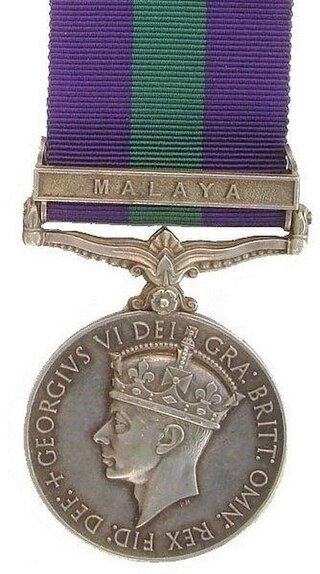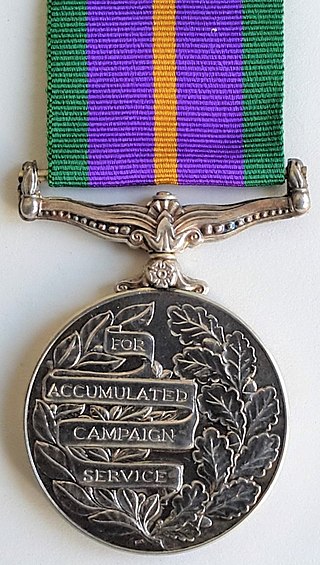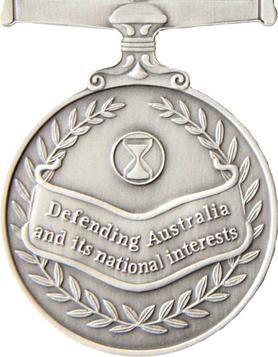
The Africa Star is a military campaign medal, instituted by the United Kingdom on 8 July 1943 for award to British and Commonwealth forces who served in North Africa between 10 June 1940 and 12 May 1943 during the Second World War.
The NATO Medal is an international military decoration which is awarded to various militaries of the world under the authority of the North Atlantic Treaty Organization (NATO). It is manufactured by Eekelers-Centini Intl, of Hemiksem, Belgium.
British campaign medals are awarded to members of the British Armed Forces, Allied forces and civilians participating in specified military campaigns. Examples include the Defence Medal, for homeland defence in World War II, and the Atlantic Star for World War II sea service in the Atlantic.

The Australian Active Service Medal (AASM) is an Australian military decoration. It was authorised on 13 September 1988 to recognise prescribed service in "warlike" operations, backdated to February 1975. It is awarded with a clasp to denote the prescribed operation and subsequent awards of the medal are made in the form of additional clasps. In 2012, it was announced that the medal would no longer be issued for future operations, with the AASM and the Australian Service Medal being replaced by the Australian Operational Service Medal.

The 1939–1945 Star is a military campaign medal instituted by the United Kingdom on 8 July 1943 for award to British and Commonwealth forces for service in the Second World War. Two clasps were instituted to be worn on the medal ribbon, Battle of Britain and Bomber Command.

The Iraq Medal was authorised on 23 February 2004. It was a campaign medal issued to members of the British Armed Forces and certain attached personnel, who served between 20 January 2003 and 22 May 2011 on, or in support of, Operation Telic - the designation for British operations during the 2003 Invasion of Iraq and its aftermath.

The Operational Service Medal for Sierra Leone is a campaign medal established in 2000 by the Ministry of Defence of the United Kingdom for participation in the British military intervention during and after the Sierra Leone Civil War, from May 2000 to July 2002.

The Operational Service Medal for Afghanistan is a campaign medal previously awarded by the Ministry of Defence of the United Kingdom for service by British Armed Forces personnel in support of the post-2001 Afghan War.

The Operational Service Medal for the Democratic Republic of the Congo is a British armed forces campaign medal, awarded mostly to military personnel who served between 14 June and 10 September 2003 on Operation Coral.

The General Service Medal was instituted to recognise service in minor Army and Royal Air Force operations for which no separate medal was intended. Local forces, including police, qualified for many of the clasps, as could units of the Indian Army prior to 1947.

The General Service Medal, is a campaign medal of the United Kingdom introduced in 1962 to replace both the General Service Medal (1918), as awarded to the Army and RAF, and the Naval General Service Medal (1915). The 1962 GSM was awarded until 2007, when it was replaced by the Operational Service Medal. In 2015 the General Service Medal (2008) was introduced.

The Australian Service Medal is an Australian military decoration. It was authorised 13 September 1988 to recognise prescribed service in peacekeeping and non-warlike operations. It is awarded with a clasp to denote the prescribed operation and subsequent awards of the medal are made in the form of additional clasps. The Australian Service Medal 1945–1975 recognises non-warlike service prior to February 1975. The Australian Service Medal was replaced in 2012 by the Australian Operational Service Medal, except for ongoing missions.

The Afghanistan Medal, sanctioned on 19 March 1881, was awarded to members of the British and Indian armies who served in Afghanistan between 1878 and 1880 during the Second Afghan War, the first war being from 1839 to 1842.

Warrant Officer Class 2 Gary John O'Donnell, was a British Army bomb disposal expert who was awarded the George Medal twice. The George Medal is the second highest decoration, after the George Cross, for "acts of great bravery" not "in the face of the enemy". His second George Medal was the first such award in 26 years and the first ever posthumous bar. O'Donnell was killed in an improvised explosive device (IED) attack in Afghanistan.
Operational Service Medal may refer to:

The Accumulated Campaign Service Medal and the Accumulated Campaign Service Medal 2011 are medals awarded by King Charles III to members of his Armed Forces to recognise long campaign service. The original Accumulated Campaign Service Medal, instituted in January 1994, was awarded to holders of the General Service Medal (1962) who had completed 36 months of accumulated campaign service. The replacement Accumulated Campaign Service Medal 2011 is now currently awarded to holders of various campaign service medals who have completed 24 months of campaign service.

The Australian Operational Service Medal is a campaign medal established on 22 May 2012 to recognise service by Australian Defence Force (ADF) personnel on designated hazardous operations. It may also be awarded to civilians who serve alongside the ADF on designated operations under specific conditions.

The Operational Service Medal Iraq and Syria or Operation Shader Medal is a British armed forces campaign medal, awarded mostly to military personnel who served in the operational area of, or in support of Operation Shader. The medal was first announced by then Defence Secretary, Sir Michael Fallon on 19 September 2017. It was first awarded, to service personnel, on 18 July 2018 in London by Defence Secretary Gavin Williamson. This Operational Service Medal is the first medal of the contemporary era to be awarded to individuals who served outside of the operational area, reflecting the changing nature of warfare.



















